人教版新目标七年级下册 Unit 11 短语、句型、作文总结
新目标七下unit11知识点

Unit 11 How was your school trip?学习一般过去时Ⅰ. 重点词组:1.go for a walk 去散步=take a walkk a cow 挤牛奶3.ride a horse 骑马4.feed chickens 喂鸡feed on sth 以某物为食5.talk with 和…交谈=have a talk with…6.take photos (for) 拍照7.show sb. around 带领…参观8.in the countryside 在农村9.go fishing 去钓鱼10.go to the zoo 去动物园11.climb the mountains 爬山in the mountains 在山区12.visit a museum 参观博物馆13.fire station 消防站14.draw pictures 画画15.science museum 科学博物馆16.by train 乘火车17.all in all 总的来说,总而言之= on the whole=in a word18.be interested in (doing) sth对…感兴趣19.not…at all 一点也不;根本不20.quite+形/副相当quite + a / an + 形容词+可数名词单数= a + very + 形容词quite a lot 相当多21.too many + 可数名词复数太多的……too much +不可数名词22.teach sb. how to do sth. 教某人怎样做某事teach sb sth=teach sth to sb23.learn about 了解=know about24.grow strawberries 种植草莓pick strawberries 采草莓25.from..to…从…到…26.at night 在夜晚e out 出来;出版;(太阳,月)升起28.along the way 沿线29.buy sth. for sb. 为某人买某物= buy sb. sth.30.go on a school trip 去学校郊游=have a school trip31.take a / the train 乘火车Ⅱ.重点句型:1.—How was your school trip?你的学校郊游怎么样?—It was great! 好极了!2.—Did you go to the zoo? 你去动物园了吗?—No, I didn’t. I went to a farm.不,没有。
人教版七年级下册英语Unit11单元语法知识点总结

人教版七年级下册英语Unit11单元语法知识点总结本单元重点短语的具体用法1. school trip:学校旅行。
例如:We had a great school trip to the museum.(我们去博物馆的学校旅行非常棒。
)2. go for a walk:去散步。
例如:I like to go for a walk in the park after dinner.(我喜欢晚饭后去公园散步。
)3. milk a cow:挤牛奶。
例如:Did you ever milk a cow before?(你以前挤过牛奶吗?)4. ride a horse:骑马。
例如:She enjoys riding a horse on the weekends.(她喜欢在周末骑马。
)5. feed chickens:喂鸡。
例如:My grandpa feeds chickens every morning.(我爷爷每天早上喂鸡。
)6. talk with a farmer:与农民交谈。
例如:I had a interesting talk with a farmer about farming.(我与一位农民进行了关于农业的有趣交谈。
)7. take some photos:照相。
例如:Let's take some photos to remember this moment.(让我们照些相来记住这一刻。
)8. ask some questions:问一些问题。
例如:He always asks some questions in class.(他总是在课堂上问一些问题。
)9. grow apples:种苹果。
例如:They grow apples in their orchard.(他们在果园里种苹果。
)10. show sb. around sp.:带某人逛某地。
例如:The guide showed us around the city.(导游带我们逛了这座城市。
新目标英语七年级(下)Unit_11知识要点归纳
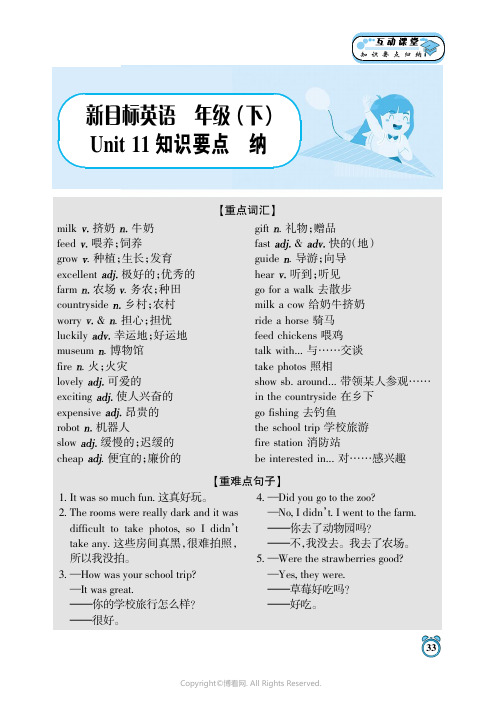
栏纳milk 挤奶牛奶feed 喂养;饲养grow .种植;生长;发育excellent 极好的;优秀的farm 农场.务农;种田countryside 乡村;农村worry &.担心;担忧luckily 幸运地;好运地museum .博物馆fire .火;火灾lovely 可爱的exciting 使人兴奋的expensive 昂贵的robot 机器人slow 缓慢的;迟缓的cheap .便宜的;廉价的gift .礼物;赠品fast &快的(地)guide .导游;向导hear 听到;听见go for a walk 去散步milk a cow 给奶牛挤奶ride a horse 骑马feed chickens 喂鸡talk with...与……交谈take photos 照相show sb.around...带领某人参观……in the countryside 在乡下go fishing 去钓鱼the school trip 学校旅游fire station 消防站be interested in...对……感兴趣1.It was so much fun.这真好玩。
2.The rooms were really dark and it was difficult to take photos,so I didn ’t take any.这些房间真黑,很难拍照,所以我没拍。
3.—How was your school trip?—It was great.———你的学校旅行怎么样?———很好。
4.—Did you go to the zoo?—No,I didn ’t.I went to the farm.———你去了动物园吗?———不,我没去。
我去了农场。
5.—Were the strawberries good?—Yes,they were.———草莓好吃吗?———好吃。
【重点词汇】【重难点句子】33Copyright ©博看网. All Rights Reserved.。
(完整版)新目标人教版英语七下unit11知识点总结.doc
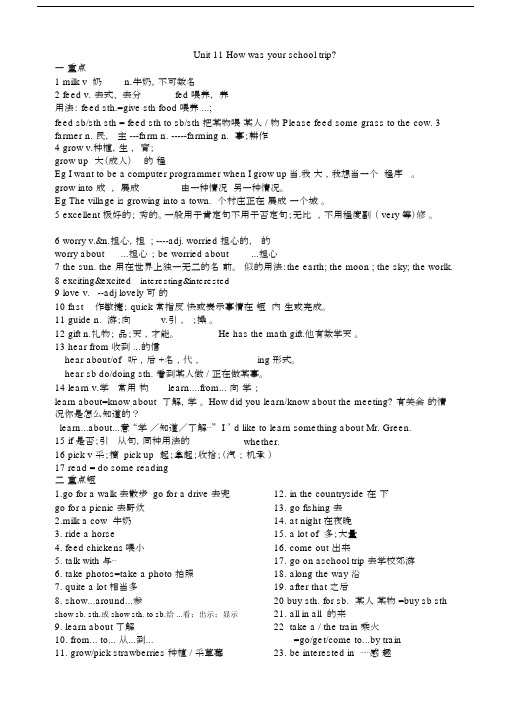
Unit 11 How was your school trip?一重点1 milk v 奶n.牛奶,不可数名2 feed v.去式、去分fed 喂养,养用法: feed sth.=give sth food 喂养 ...;feed sb/sth sth = feed sth to sb/sth 把某物喂某人 / 物 Please feed some grass to the cow. 3 farmer n.民,主 ---farm n. -----farming n. 事;耕作4 grow v.种植,生,育;grow up 大(成人)的程Eg I want to be a computer programmer when I grow up当.我大,我想当一个程序。
grow into 成,展成由一种情况另一种情况。
Eg The village is growing into a town. 个村庄正在展成一个城。
5 excellent 极好的;秀的。
一般用于肯定句不用于否定句;无比,不用程度副( very 等)修。
6 worry v.&n.担心,担 ; ----adj. worried 担心的,的worry about...担心; be worried about...担心7 the sun. the 用在世界上独一无二的名前。
似的用法:the earth; the moon ; the sky; the worlk.8 exciting&excited interesting&interested9 love v. --adj lovely 可的10 fast 作敏捷; quick 常指反快或表示事情在短内生或完成。
11 guide n. 游;向v.引,;操。
12 gift n.礼物;品;天,才能。
He has the math gift.他有数学天。
13 hear from 收到 ...的信hear about/of听,后+名,代,ing 形式。
人教版新目标七年级下册Unit 11 复习提纲
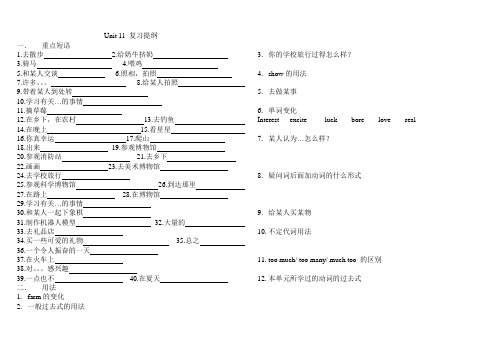
Unit 11 复习提纲一.重点短语
1.去散步
2.给奶牛挤奶
3.骑马
4.喂鸡
5.和某人交谈
6.照相,拍照
7.许多。
8.给某人拍照
9.带着某人到处转
10.学习有关…的事情
11.摘草莓
12.在乡下,在农村13.去钓鱼
14.在晚上15.看星星
16.你真幸运17.爬山
18.出来19.参观博物馆
20.参观消防站21.去乡下
22.画画23.去美术博物馆
24.去学校旅行
25.参观科学博物馆26.到达那里27.在路上28.在博物馆
29.学习有关…的事情
30.和某人一起下象棋
31.制作机器人模型32.大量的
33.去礼品店
34.买一些可爱的礼物35.总之
36.一个令人振奋的一天
37.在火车上
38.对。
感兴趣
39.一点也不40.在夏天
二.用法
1.farm的变化
2.一般过去式的用法
3.你的学校旅行过得怎么样?
4.show的用法
5.去做某事
6.单词变化
Interest excite luck bore love real 7.某人认为…怎么样?
8.疑问词后面加动词的什么形式
9.给某人买某物
10.不定代词用法
11.too much/ too many/ much too 的区别
12.本单元所学过的动词的过去式。
新版新目标英语七年级下册unit11知识点总结
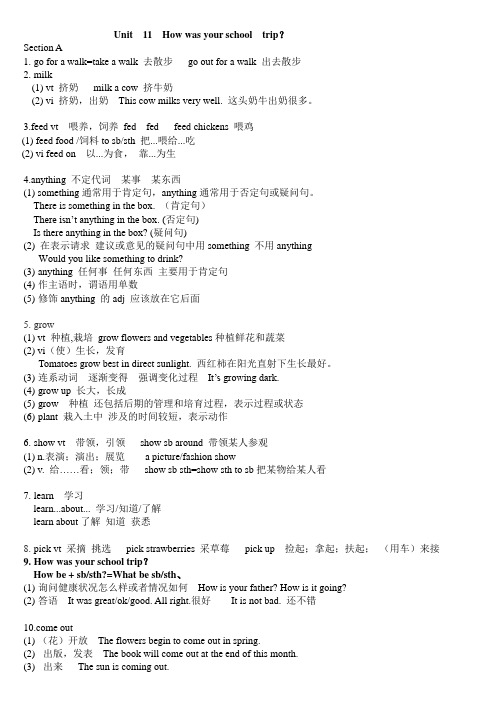
Unit 11 How was your school trip?Section A1.go for a walk=take a walk 去散步go out for a walk 出去散步k(1) vt 挤奶milk a cow 挤牛奶(2) vi 挤奶,出奶This cow milks very well. 这头奶牛出奶很多。
3.feed vt 喂养,饲养fed fed feed chickens 喂鸡(1) feed food /饲料to sb/sth 把...喂给...吃(2) vi feed on 以...为食,靠...为生4.anything 不定代词某事某东西(1) something通常用于肯定句,anything通常用于否定句或疑问句。
There is something in the box. (肯定句)There isn’t anything in the box. (否定句)Is there anything in the box? (疑问句)(2) 在表示请求建议或意见的疑问句中用something 不用anythingWould you like something to drink?(3)anything 任何事任何东西主要用于肯定句(4)作主语时,谓语用单数(5)修饰anything 的adj 应该放在它后面5.grow(1) vt 种植,栽培grow flowers and vegetables种植鲜花和蔬菜(2) vi(使)生长,发育Tomatoes grow best in direct sunlight. 西红柿在阳光直射下生长最好。
(3)连系动词逐渐变得强调变化过程It’s growing dark.(4)grow up 长大,长成(5)grow 种植还包括后期的管理和培育过程,表示过程或状态(6)plant 栽入土中涉及的时间较短,表示动作6.show vt 带领,引领show sb around 带领某人参观(1) n.表演;演出;展览 a picture/fashion show(2) v. 给……看;领;带show sb sth=show sth to sb把某物给某人看7.learn 学习learn...about... 学习/知道/了解learn about了解知道获悉8.pick vt 采摘挑选pick strawberries 采草莓pick up 捡起;拿起;扶起;(用车)来接9.How was your school trip?How be + sb/sth?=What be sb/sth、(1)询问健康状况怎么样或者情况如何How is your father? How is it going?(2)答语It was great/ok/good. All right.很好It is not bad. 还不错e out(1)(花)开放The flowers begin to come out in spring.(2)出版,发表The book will come out at the end of this month.(3)出来The sun is coming out.Section B1.fire(1)n.火[U] Do you know horses are afraid of fire? 你知道马怕火吗?(2)炉火;篝火;火灾[C] Don’t play with fire. There was a big fire in the next street yesterday.(3)be on fire 着火(4)make a fire 生火2.go on a trip to ...到某处去旅行go on a hike/picnic/visit/vacationon…trip 在……旅行期间,on进行,从事于……He is on a trip in America.3.all in all 总的来说句首All in all,we had a good time.in all 总共,合计句首句末at all 根本常用语否定句中not at all 一点也不,根本不after all 毕竟,终究句首句中句末above all 首先,最重要的是句首句中做插入语4.interesting adj 用来修饰物the film is interesting.interested adj 用来修饰人I am interested to hear your story.-ing后缀都是用来修饰物的,令人...的surprising 令人惊奇的ed后缀是用来修饰人的,感到...的surprised 感到惊奇的embarrassing/embarrassed, worrying/worried, amazing/amazed, shocking/shocked5.listen强调听的动作听hear强调听的结果听见听到一般过去时态1. 用法:①过去某个时间发生的动作His mother made some dumplings yesterday.②过去某个时间存在的状态Jim was 12 years old.③过去经常或反复发生的动作He often went to swim when he was a child.2. 与一般过去时连用的时间状语yesterday, last night, in 1990, once, two days ago, the day before yesterday , the other day几天前3.4.①一般在动词词尾加ed want →wanted②以e结尾的动词,只加d live →lived③以辅音字母加y结尾的动词,改y为i,再加ed stu dy →studied④以重读闭音节结尾,末尾只有一个辅音字母,双写这一辅音字母,再加ed stop →stopped。
人教版七年级下册英语unit11句型总结:

2015肥城市湖屯中学新目标英语七年级下unit11句型总结:1.你的校游怎么样?极好。
2.汤姆的校游怎么样?很糟糕。
3.我没有看到一些马,但是我看到了一些奶牛。
4.你能骑马吗?是的,我能。
5.你能帮我喂鸡吗?6.上周我在公园照了一些照片。
7.你在动物园里看到了一些动物吗?是的,我看到了很多。
8.昨天我们去了一个艺术博物馆。
9.我的父母同我的英语老师谈了话。
10.你晚饭后散步了吗?11.在我们学校了有很多树和花。
12.昨天晚上,我在电视上看赛龙舟比赛。
13.他是一个优秀的学生。
14.姚明是一名优秀的篮球运动员。
15.我爷爷在乡下中了很多苹果和草莓。
16.我的父母亲住在乡下。
17.这些农民在摘苹果,他们看上去很高兴。
18.昨天,我和我的同班同学乘公共汽车去了一个历史博物馆。
19.我们在博物馆里看到了许多油画。
20.我每天有相当多的作业要做。
21.在医院的前面有一个大的消防站。
22.上周,我和我爸爸爬山了。
23.去年,他们经常钓鱼。
24.昨天是星期天,我们都在家。
25.钱是重要的,但是它不能买到一切。
26.任何事情都是关于机器人的。
27.我认为对于我们来说学好英语是很重要的。
28.我的手表慢2分钟.29.这台机器人是昂贵的。
30.我希望我能有一辆机器人帮助我做作业。
31.昨天我看了一场令人兴奋地足球比赛。
32.这件毛衣很便宜,所以我想买它。
33.在黑暗的房间里照相是很困难的。
34.当他七岁的时候,他就会游泳。
35.当她五岁的时候,她就能唱英语歌。
36.在我的十三岁生日上,我得到了很多礼物。
37.孩子们可以在儿童节那天得到许多来自于他们父母亲的礼物。
38.我在礼品店为我的父母买了一些可爱的礼物。
39.昨天我妈妈给我买了一辆自行车。
40.在她十二岁的生日上,他的父母亲为她买了很多礼物。
41.我们有买任何东西,因为他们太贵了。
42.他对下棋感兴趣。
43.我们对英语感兴趣。
44.迈克对汉语感兴趣。
45.这个男孩对学习感兴趣。
新人教七年级下期末复习Unit11重点词组句子
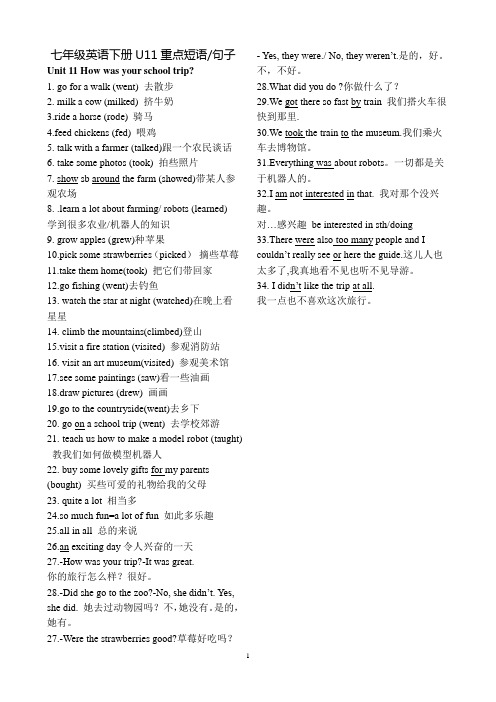
七年级英语下册U11重点短语/句子Unit 11 How was your school trip?1. go for a walk (went) 去散步2. milk a cow (milked) 挤牛奶3.ride a horse (rode) 骑马4.feed chickens (fed) 喂鸡5. talk with a farmer (talked)跟一个农民谈话6. take some photos (took) 拍些照片7. show sb around the farm (showed)带某人参观农场8. .learn a lot about farming/ robots (learned)学到很多农业/机器人的知识9. grow apples (grew)种苹果10.pick some strawberries(picked)摘些草莓11.take them home(took) 把它们带回家12.go fishing (went)去钓鱼13. watch the star at night (watched)在晚上看星星14. climb the mountains(climbed)登山15.visit a fire station (visited) 参观消防站16. visit an art museum(visited) 参观美术馆17.see some paintings (saw)看一些油画18.draw pictures (drew) 画画19.go to the countryside(went)去乡下20. go on a school trip (went) 去学校郊游21. teach us how to make a model robot (taught)教我们如何做模型机器人22. buy some lovely gifts for my parents (bought) 买些可爱的礼物给我的父母23. quite a lot 相当多24.so much fun=a lot of fun 如此多乐趣25.all in all 总的来说26.an exciting day令人兴奋的一天27.-How was your trip?-It was great.你的旅行怎么样?很好。
人教版七年级下册unit 11单元考点归纳
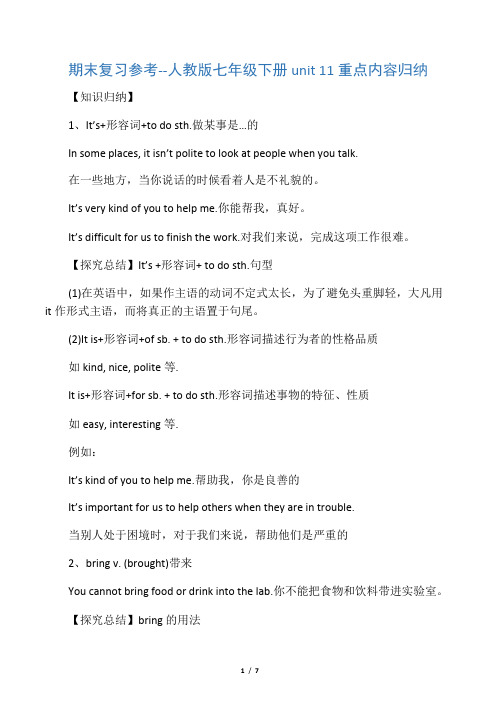
期末复习参考--人教版七年级下册unit 11重点内容归纳【知识归纳】1、It’s+形容词+to do sth.做某事是…的In some places, it isn’t polite to look at people when you talk.在一些地方,当你说话的时候看着人是不礼貌的。
It’s very kind of you to help me.你能帮我,真好。
It’s difficult for us to finish the work.对我们来说,完成这项工作很难。
【探究总结】It’s +形容词+ to do sth.句型(1)在英语中,如果作主语的动词不定式太长,为了避免头重脚轻,大凡用it作形式主语,而将真正的主语置于句尾。
(2)It is+形容词+of sb. + to do sth.形容词描述行为者的性格品质如kind, nice, polite等.It is+形容词+for sb. + to do sth.形容词描述事物的特征、性质如easy, interesting等.例如:It’s kind of you to help me.帮助我,你是良善的It’s important for us to help others when they are in trouble.当别人处于困境时,对于我们来说,帮助他们是严重的2、bring v. (brought)带来You cannot bring food or drink into the lab.你不能把食物和饮料带进实验室。
【探究总结】bring的用法(1)bring作动词用,意为“带来”,其过去式为brought常构成短语:bring sb. sth. = bring sth. to sb.意为“给某人带来某物”bring up意为“养育”。
(2)bring, take, carry与get的用法辨析:bring表示从别处把某人或物“带来”或“拿来”take指把某人或物“带走”或“拿走”(到别处)carry指“搬运”,不详尽说明来去的方向,有时含有惨重或麻烦之意get指到别处把某物取来,相当于go and bring3、each pron.各个,每个In the US some people shake hands, and some kiss or hug each other.在美国,有些人握手,有些人亲吻或彼此拥抱。
人教版七年级英语下册Unit 11重点短语、语法汇总
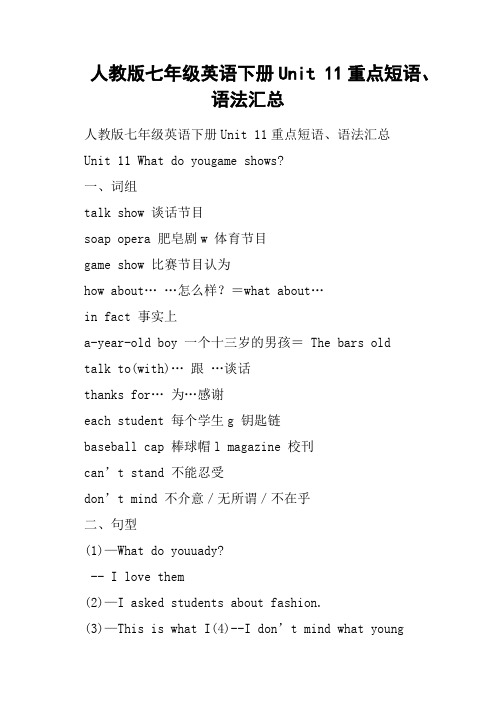
人教版七年级英语下册Unit 11重点短语、语法汇总人教版七年级英语下册Unit 11重点短语、语法汇总Unit 11 What do yougame shows?一、词组talk show 谈话节目soap opera 肥皂剧w 体育节目game show 比赛节目认为how about… …怎么样?=what about…in fact 事实上a-year-old boy 一个十三岁的男孩= The bars oldtalk to(with)… 跟…谈话thanks for… 为…感谢each student 每个学生g 钥匙链baseball cap 棒球帽l magazine 校刊can’t stand 不能忍受don’t mind 不介意/无所谓/不在乎二、句型(1)—What do youuady?-- I love them(2)—I asked students about fashion.(3)—This is what I(4)--I don’t mind what youngpeopl!(5)—Can you please put my lxt month’s magazine?三、日常交际用语(1)—What do youuop operas?--- I love them/I don’t mind them/I can’t stand them/I don’t like.(2)—How about you? ---I do.too.(3)--What do you…?--=How do you like…?如:What do youure?=How do you lure?。
人教版初中英语七下unit11笔记

Unit 11 How was your school trip?一、单元语法点: 一般过去时1.定义:表示过去某个时间或者某一段时间内发生的动作或存在的状态,也表示过去经常或反复发生的动作.2.句型结构:1)含be 动词am/is→ was are→ were肯定句:主语+was/were + 其他.否定句:主语+was/were + not 其他.一般疑问句:Was/Were +主语+其他?肯定回答:Yes, 主语+was/were ;否定回答:No, 主语+was/were not特殊疑问句:疑问词+一般疑问句(除去句中提问部分)?Eg:Tom was a student ten years ago.Tom wasn’t a student ten years ago.Was Tom a student ten years ago ? Yes, he was; No, he wasn’t.Who was Tom ten years ago ?2)含实义动词(否定句和疑问句借助did)(无人称和单复数的变化)肯定句:主语+动词过去式+ 其他.否定句:主语+didn’t +动词原形+其他.一般疑问句:Did +主语+动词原形+其他?肯定回答:Yes, 主语+did ;否定回答:No, 主语+didn’t.特殊疑问句:疑问词+一般疑问句(除去句中提问部分)?Eg:Tom went to the zoo yesterday.Tom didn’t go to the zoo yesterday .Did Tom go to the zoo yesterday ? Yes, he did; No, he didn’t.What did Tom do yesterday ? When did Tom go to the zoo?3.标志词:(一般以现在作为时间参考点)1)yesterday;2)时间段+ago; ten years /months/weeks .....ago3)last+年/月/周/星期last year/month/week/Sunday.....4)in+年/those days在那些天in 20094.规则动词的过去式变化规则:1).一般情况下在动词原形后+ed.eg:milk →________;talk →________;show→________;pick →________2)以不发音e结尾的+d.eg: live → __________ ;hope → _________ ;use → ________ ;arrive→ ________3).以重读闭音节结尾的动词,双写末尾仅有的辅音字母,再+ed.eg: stop → __________ ;plan → __________ ;drop → _________4).以辅音字母+y结尾的,变y为i+ed.eg:study → __________;carry → __________;worry →;__________5.常用不规则动词的过去式变化(必背)①go → ________ ①ride → ________ ①feed → ________ ①take → ________①do → ________ ①say → ________ ①see → ________ ①grow → ________①eat → ________ ①have/has → ________ ①buy → ________ ①get → ________①come → ________ ①draw → ________ ①know→ ________ ① teach→ ________①make→________ ①swim→________ ①bring → __________ ①cut → ________21.drink → ________ 22.drive → ________ 23.feel → ________ 24.fight → ________25.find →__________ 26.fly → ________ 27.forget →__________ 28.hear → ________ 29.keep → ________ 30.wear → ________ 31.write→ ________ 32. leave → ________ 33.let → ________ 34. lose → ________ 35.meet → ________ 36.pay → ________ 37.put → ________ 38.read → ________ 39.run → ________ 40.sell → ________41.sing → ________ 42.sit → ________ 43.sleep → _______ 44.speak → ________45.spend → ________ 46. stand → ________ 47 tell → ________ 48.think → ________ 49.can→ ________ 50.study→ ________二、常用句型:1.How be .....?=What be .....like ?.....怎么样?How is the weather today?=what’s the weather like today?今天天气如何?How was your school trip?=What was your school trip like?你的学校旅行怎么样?2.How do you feel (about sth) ?=How do you like sth?=What do you think of sth ?你认为....怎样?3.I don’t know how to do it.(it 是do 的宾语)= I don’t know what to do next.(what 和do是动宾关系)我不知道接下来该做什么?三、◆短语归纳1). go for a walk=take/have a walk 去散步2). milk a cow=milk cows 挤牛奶3). ride a horse=ride horses 骑马4). feed chickens 喂小鸡5). talk with 与……谈话6). take photos=take a photo 拍照take some photos拍很多照片7). quite a lot =very相当多8). show… around 带领……参观9). learn about 了解10). from… to… 从……到……11). grow strawberries 种植草莓;grow up 长大/成长;grow into 长成;12). pick strawberries 采草莓; pick up(动副短语)捡起/拿起/接人13). in the countryside 在乡下14). go fishing 去钓鱼;go climbing去爬山;go swimming去游泳;go shopping去购物;go hiking去远足;go skating去滑雪15). at night 在夜晚;at noon 在中午16). a lot of=lots of 许多;大量17). come out 出来/ 开花18). go on a school trip 去学校郊游19). along the way沿线;by the way 顺便说/顺便问一下;on the way to +地点在去....途中On one’s way home 在某人回家途中;20). after that 之后21). all in all 总的来说22).be interested in 对……感兴趣23). not… at all 根本不……not at all 不客气/不用谢24).Sounds great 听起来棒极了.四、理解后记忆:1.复合不定代词:something;everything;anything;nothing;a.后加形容词adj或不定式to do.(修饰词后置)eg: something important一些重要的事情/东西;something to eat一些吃的东西b.作主语时,看成三单,谓语动词用单数.eg: Nothing is impossible.一切皆有可能.c.Something用于肯定句;anything用于疑问句;nothing=not anythingeg:Is there anything to eat ?有任何吃的东西吗?I eat nothing=i don’t eat anything .我什么也没吃.I buy nothing=I didn’t buy anything.我什么也没买.2.study for .....为....而学习eg:Tom is studying for my English test.3.feed sth to sb把....喂给...吃=feed sb with/on sth用....喂....4.sound + adj Sounds great听起来棒极了;sound like+短语/句子eg:It sounds like you like English.5.quite a lot 整体看成是副词adv,修饰动词;eg:I saw quite a lot.我看到很多. quite a lot of +可数名词复数/不可数名词eg:There are quite a lot of books in the library.图书馆有相当多的书.6.ask sb sth=ask sb about sth 询问某人某事ask ab (not)to do sth要求某人(不要)做某事ask sb for sth.向某人要某物ask for help 寻求帮助7.learn to do sth学习做某事;learn ....from....向/从....学习;learn a lot of about...学习/了解很多关于....8.watch sb do sth.观看某人过去做了/经常做某事(强调过程/结果)watch sb doing sth.观看某人正在做某事(强调正在进行)eg:I often watch Tom play basketball after school.我经常看到汤姆在放学之后打篮球.Look, many people watch the monkeys climbing around.看,很多人在看猴子到处爬来爬去.相同类似的用法有:一感feel sb do/doing sth;二听hear/listen to sb do/doing sth ;三让let/make/have do sth ;四看see/watch/look at/notice sb do/doing sth ;另发现find sb do/doing sth → listen 是不及物动词,后面不能直接跟宾语9.teach sb sth教某人某事teach us English教我们英语;teach sb to do sth教某人去做某事10.1)not ...at all(not通常隐藏在谓语动词里)Eg:I don’t like ice-cream at all.我一点也不喜欢冰淇淋.Tom isn’t kind at all.汤姆一点也不善良.2)not at all不客气/不用谢-Thanks -not at all.不用谢11. arrive at+小地点到达小地点;arrive in +大地点到达大地点arrive there/here/home 到达那/这/家12.复习:1)buy sb sth=buy sth for sb买某物给某人; sell sb sth= sell sth to sb.卖某物给某人;2)get on/off bus/train 上/下公共汽车/火车2)too much +不可数名词;too many+可数名词复数;much too+adj/adv3)表建议:let/what about/why don’t you do/why not do五、名词n1.同类一起记:n & vmilk名词:牛奶(不可数名词);动词:挤奶;worry名词:令人发愁的事(可数)/忧虑(不可数);动词:担心(三单worries);fire名词:火(火灾可数;火不可数); 动词:领导/带领;flower名词:;花; 动词:浇花;guide名词:导游; 动词:领导/带领;farm名词:农场; 动词:务农/种田;2.fire station消防站;回顾:radio station/bus station/police station3.打包记忆:farm-farming-farmer六、形容词adj/副词adv1)exciting 常修饰物an exciting day令人兴奋的一天;excited 常修饰人be excited at/about ....某人对....感到兴奋;同理:interesting 常修饰物an interesting news一个有趣的消息;interested 常修饰人be interested in sth/doing sth 对某事/做某事感兴趣2)luck名词幸运-lucky形容词幸运的-unlucky形容词不幸的luckily副词幸运地-unluckily副词不幸地3)ly结尾是adj: lovely可爱的;friendly友好的4)正反义词:expensive昂贵的-cheap便宜的; slow慢的-fast快的5)用an 的形容词:an art museum一个美术博物馆;an exciting news 一个令人兴奋的消息;an excellent actist一个杰出的画家;an interesting book 一本有趣的书;七、作文:描述过去发生的事情描述过去经历:框架:时间+地点+和谁+天气+交通方式+所见所闻所尝所做+感受Last weekend, I went to 某地with my parents,the weather was great and we took the train to there, we visited many places in 某地.First of all, we visited ....., then ..........the food were delicious,and the people were friendly.We had great fun in 某地./We were tired but happy.范文:An Exciting TripLast weekend,I went to the museum with my parents.We left at 8:30 in the morning.We went there by bus .It took us about 30 minutes to get to the museum. In the museum,we saw many old and interesting things. We also listened to the guide along the way,he told us many history stories,they are very interesting.And we watched the video about the museum,too. We came back at 5:00 in the afternoon.We were tired but happy and excited.。
七年级英语下册Unit11Howwasyourschooltrip短语、句型、作文总结人教新目标版
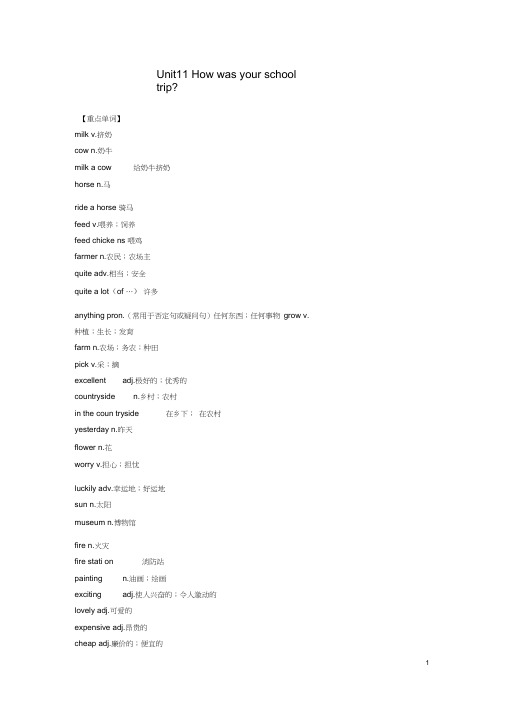
Unit11 How was your schooltrip?【重点单词】milk v.挤奶cow n.奶牛milk a cow 给奶牛挤奶horse n.马ride a horse 骑马feed v.喂养;饲养feed chicke ns 喂鸡farmer n.农民;农场主quite adv.相当;安全quite a lot(of …)许多anything pron.(常用于否定句或疑问句)任何东西;任何事物grow v.种植;生长;发育farm n.农场;务农;种田pick v.采;摘excellent adj.极好的;优秀的countryside n.乡村;农村in the coun tryside 在乡下;在农村yesterday n.昨天flower n.花worry v.担心;担忧luckily adv.幸运地;好运地sun n.太阳museum n.博物馆fire n.火灾fire stati on 消防站painting n.油画;绘画exciting adj.使人兴奋的;令人激动的lovely adj.可爱的expensive adj.昂贵的cheap adj.廉价的;便宜的slow adj.缓慢的;迟缓的fast adv&adj 快地(的)robot n.机器人guide n.导游;向导 gift n.礼物;赠品be in terested in对……感兴趣9. grow apples 种苹果 10. show sb. around splace.12. pick some strawberries 13. last week 上周15. visit my gran dpare nts 16. go fishi ng 去钓鱼 17. sou nd good 听起来很好21. visit a fire stati on 22.draw pictures 画画24 visit the scie nee museum25. how to make a model robot26. gift shop 礼品店27. buy sth for sb. 为某人买某物28. all in all 总得来说29. be in terested in... 对…感兴趣30. be expe nsive 昂贵的all in all总的说来 everyth ing pron. —切;所有事物in terested adj.感兴趣的 hear(heard ) v.听到; 【重点短语】 1. school trip 学校旅行 2. go for a walk 去散步 3. milk a cow 挤牛奶 4. ride a horse 骑马 5. feed chicke ns 喂鸡 6. talk with a farmer 听见 dark adj.黑暗的;昏暗的 14. In the countryside 在乡村 23. go on a school trip 去旅行与农民交谈 7. take some photos 照相 8. ask some questi ons 问一些问题 带某人逛某地 11. lear n a lot 学到许多 摘草莓 拜访我的祖父母 18. climb the mountains 去爬山 19. play some games 玩一些游戏 20. visit a museum 参观博物馆 参观消防站 参观科技博物馆 如何制作机器人模型31. not...at all 一点儿也不【重点句型】1. —Did you see any cows?你见到奶牛了吗一Yes, I did. I saw quite a lot.我见到了而且见到了很多很多2. —Did Carol take any photos?罗尔拍照片了吗?—Yes, she did.是的,她拍了。
新目标七年级英语下册Unit11Howwasyourschooltrip单元词语归结及语法精讲

新目标七年级英语下册Unit11Howwasyourschooltrip单元词语归纳及语法精讲Unit 11 How was your school trip?性1.go 去式: e 去式: came2.ride 去式: rode16.get 去式: got3.feed 去式: fed17.see 去式: saw4.farm 名: farmer18.draw 去式: drew5.take 去式: took19.paint 名: painting6.luckily 名: luck 形容: lucky20.love 形容: lovely7.grow 去式: grew21.expensive 反: cheap8.is 去式: was22.slow 反: fast9.are 去式: were23.gift 同: present10.do 去式: did形容:11.have 去式: had interested, interesting12.eat 去式: ate25.hear 去式: heard13.buy 去式: bought26.teach 去式: taught14.stop 去式: stopped短1.go for a walk 去漫步⋯ at all 一点也不;根本不k a cow 牛奶3.ride a horse20.quite a lot 相当多4.feed chickens 喂21.learn about 认识5.talk with 和⋯⋯交22.grow strawberries 栽种草莓6.take photos 摄影23.pick strawberries 采草莓⋯around⋯⋯参24.from..to⋯从⋯⋯到⋯⋯8.in the countryside 在村25.at night 在夜晚9.go fishing 去e out 出来10.go to the zoo 去物园27.along the way 沿11.climb the mountains 登山28.buy sth. for sb. = buy sb. sth. 某人12.visit a museum 参博物某物13.fire station 消防站⋯ at all 根本不⋯⋯14.draw picture 画画15.science museum科学博物30.a lot of 多;大批16.by train 乘火31.go on a shool trip 去学校郊游17.in all 一共;共32.after that 以后18.be interested in ⋯⋯ 感趣33.all in all 的来用法集萃1. How+be⋯? =What+be⋯ +like?⋯⋯怎么?2. too many+可数名复数太多的⋯⋯3. teach sb. how to do sth. 教某人怎做某事4. quite+a/an+形容 +可数名数 =a+very+形容 +可数名数一个相当 /很⋯⋯新目标七年级英语下册Unit11Howwasyourschooltrip单元词语归纳及语法精讲要点句子1.How was your school trip?2.Did you see any cows? Yes,I did.I saw quite a lot.3.Did you ride a horse? No,I didn ’t.But I milked a cow.4.What did Tina do?She picked some strawberries.5.I visited my grandparents in the countryside.6.I went fishing every day.7.The farmer showed Tina around the farm.8.It got very cloudy and we worried it would rain.9.Then the guide taught us how to make a model robot然.后,游叫我怎制作机器人模型。
人教新目标七年级英语下册Unit11Howwasyourschooltrip重点单词及句型背诵默写
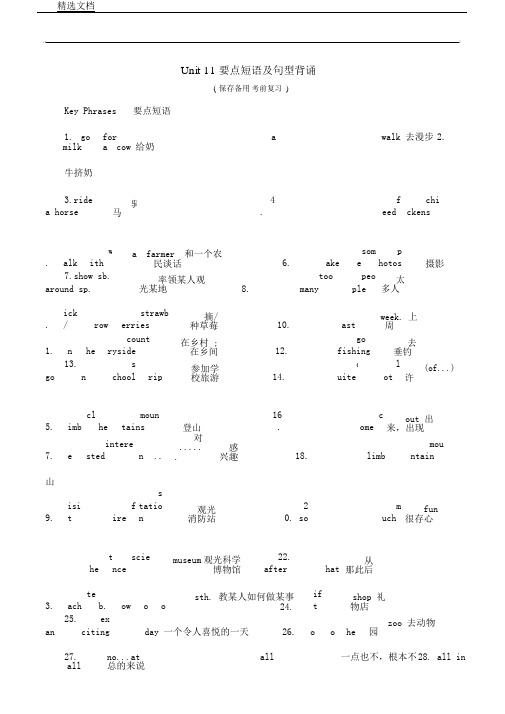
Unit 11要点短语及句型背诵( 保存备用考前复习)Key Phrases 要点短语1. go for a walk 去漫步2. milk a cow 给奶牛挤奶3.ridea horse骑马4.feedchickens喂鸡5 .talkwitha farmer 和一个农民谈话 6.takesomephotos摄影7.show sb. around sp.率领某人观光某地8.toomanypeople太多人9 .pick /growstrawberries摘/种草莓10.lastweek. 上周1 1.inthecountryside在乡村 ;在乡间12.gofishing去垂钓13. go on a schooltrip参加学校旅游14.quitelot(of...)许多1 5.climbthemountains登山16.comeout 出来,出现1 7.beinterestedin...对......感兴趣18.climb amountain登山1 9.visit a firestation观光消防站20. somuchfun很存心思t he science museum观光科学博物馆22.afterthat从那此后2 3.teachsb.how odosth. 教某人如何做某事24.giftshop 礼物店25. an exciting day 一个令人喜悦的一天26.gotothezoo 去动物园27. no...at all 一点也不,根本不28. all in all 总的来说29. learn a lot about ... 学了好多关 .... 的知识Key Sentences 要点句型1. The farmer showed Carol around the farm. 这位农场主率领卡罗尔参观了农场。
2.Carol learned a lot about farming. 卡罗尔学了很多农事。
七年级英语下册 第十一单元词汇和句型精讲 人教新目标版
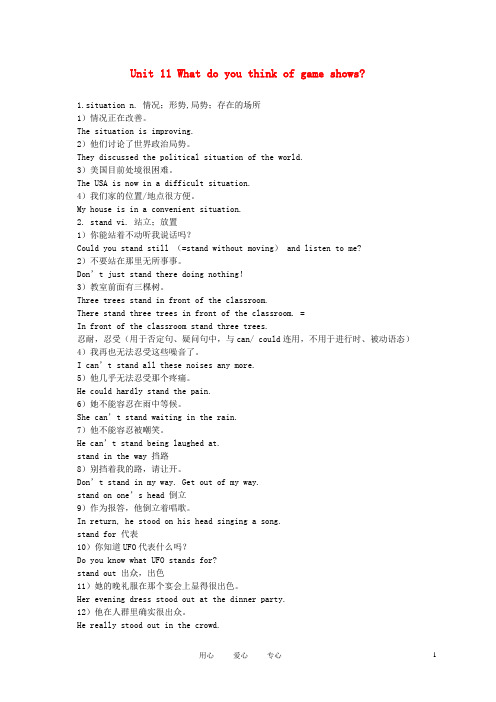
Unit 11 What do you think of game shows?1.situation n. 情况;形势,局势;存在的场所1)情况正在改善。
The situation is improving.2)他们讨论了世界政治局势。
They discussed the political situation of the world.3)美国目前处境很困难。
The USA is now in a difficult situation.4)我们家的位置/地点很方便。
My house is in a convenient situation.2. stand vi. 站立;放置1)你能站着不动听我说话吗?Could you stand still (=stand without moving) and listen to me?2)不要站在那里无所事事。
Don’t just stand there doing nothing!3)教室前面有三棵树。
Three trees stand in front of the classroom.There stand three trees in front of the classroom. =In front of the classroom stand three trees.忍耐,忍受(用于否定句、疑问句中,与can/ could连用,不用于进行时、被动语态)4)我再也无法忍受这些噪音了。
I can’t stand all these noises any more.5)他几乎无法忍受那个疼痛。
He could hardly stand the pain.6)她不能容忍在雨中等候。
She can’t stand waiting in the rain.7)他不能容忍被嘲笑。
He can’t stand being laughed at.stand in the way 挡路8)别挡着我的路,请让开。
- 1、下载文档前请自行甄别文档内容的完整性,平台不提供额外的编辑、内容补充、找答案等附加服务。
- 2、"仅部分预览"的文档,不可在线预览部分如存在完整性等问题,可反馈申请退款(可完整预览的文档不适用该条件!)。
- 3、如文档侵犯您的权益,请联系客服反馈,我们会尽快为您处理(人工客服工作时间:9:00-18:30)。
Unit11 How was your school trip?
【重点单词】
milk v.挤奶
cow n.奶牛
milk a cow 给奶牛挤奶
horse n.马
ride a horse 骑马
feed v.喂养;饲养
feed chickens 喂鸡
farmer n.农民;农场主
quite adv.相当;安全
quite a lot(of…) 许多
anything pron.(常用于否定句或疑问句)任何东西;任何事物grow v.种植;生长;发育
farm n.农场;务农;种田
pick v.采;摘
excellent adj.极好的;优秀的
countryside n.乡村;农村
in the countryside 在乡下;在农村
yesterday n.昨天
flower n.花
worry v.担心;担忧
luckily adv.幸运地;好运地
sun n.太阳
museum n.博物馆
fire n.火灾
fire station 消防站
painting n.油画;绘画
exciting adj.使人兴奋的;令人激动的lovely adj.可爱的
expensive adj.昂贵的
cheap adj.廉价的;便宜的
slow adj.缓慢的;迟缓的
fast adv&adj快地(的)
robot n.机器人
guide n.导游;向导
gift n.礼物;赠品
all in all 总的说来
everything pron.一切;所有事物interested adj.感兴趣的
be interested in 对……感兴趣
dark adj.黑暗的;昏暗的
hear(heard) v.听到;听见
【重点短语】
1. school trip 学校旅行
2. go for a walk 去散步
3. milk a cow 挤牛奶
4. ride a horse 骑马
5. feed chickens 喂鸡
6. talk with a farmer 与农民交谈
7. take some photos 照相
8. ask some questions 问一些问题
9. grow apples 种苹果
10. show sb. around splace. 带某人逛某地
11. learn a lot 学到许多
12. pick some strawberries 摘草莓
13. last week 上周
14.In the countryside 在乡村
15. visit my grandparents 拜访我的祖父母
16. go fishing 去钓鱼
17. sound good 听起来很好
18. climb the mountains 去爬山
19. play some games 玩一些游戏
20. visit a museum 参观博物馆
21. visit a fire station 参观消防站
22.draw pictures 画画
23. go on a school trip 去旅行
24 visit the science museum 参观科技博物馆
25. how to make a model robot 如何制作机器人模型
26. gift shop 礼品店
27. buy sth for sb. 为某人买某物
28. all in all 总得来说
29. be interested in... 对…感兴趣
30. be expensive 昂贵的
31. not...at all 一点儿也不
【重点句型】
1.—Did you see any cows?
你见到奶牛了吗
一Yes, I did. I saw quite a lot.
我见到了而且见到了很多很多
2.—Did Carol take any photos?
罗尔拍照片了吗?
—Yes, she did.
是的,她拍了。
3.—Hi, Eric, How was your trip last week?
你好,Eric,上周旅游怎么样?
一It was excellent. I visited my grandparents in the countryside.
精彩极了,我还去乡下看望了爷爷奶奶。
4.We had so much fun!
我们玩得非常开心!
5.I took a lot of great photos, too.
我也拍了好多精彩照片。
6. All in all, it was an exciting day.
总之,这是令人兴奋的一天。
7. I’m not interested in that.
我对此并不感兴趣。
【话题写作】
(一)主题:介绍过去的活动
I had a busy weekend. On Saturday morning, I did my homework, and then I played computer games. In the afternoon, I visited my grandmother. We talked for a long time.
On Sunday morning, I cleaned my room and did some reading. Then I cooked for m parents. In the afternoon, I watched a football match on TV and listened to music. I had a good time.
(二)【写作题目】暑假已经过去,同学们都相互询问时如何度过这个假期的,请你用英语写一封信把你的假期和同学交流一下,向他们描述你的既有意义又充实的假期。
提示:(1)坚持运动,锻炼身体(2)多读好书(3)旅游观光(4)当一名志愿者(5)帮助父母。
【优秀满分范文】
Dear Li Ping,
I had a good time during my summer vacation. Here is my vacation to show you.
First I did sports and learned to play table tennis. It’s good for my health. Then I read some books .After that I enjoyed an interesting sight for two weeks. Also, I volunteered to serve in the volleyball game. Of course, at home I helped my parents do some cooking , washing and so on.
I think I had a wonderful time during the vacation . Did you have a nice summer vacation ? P lease tell me !
Yours
Tom。
